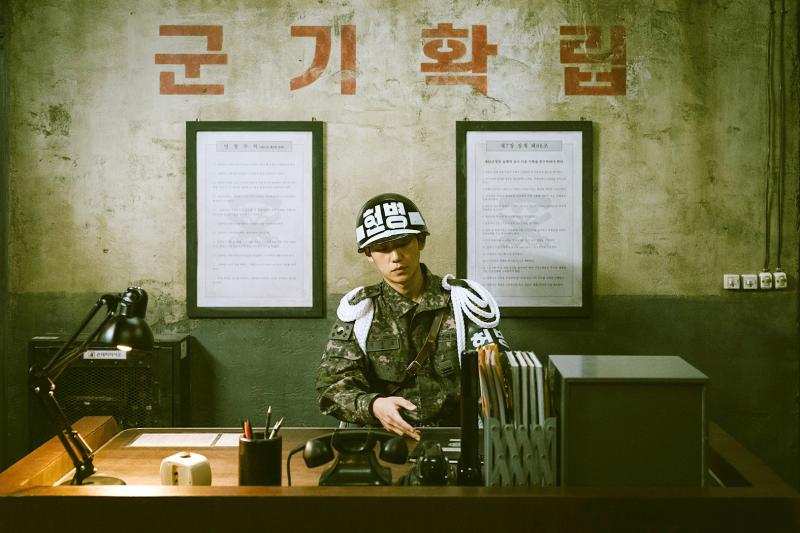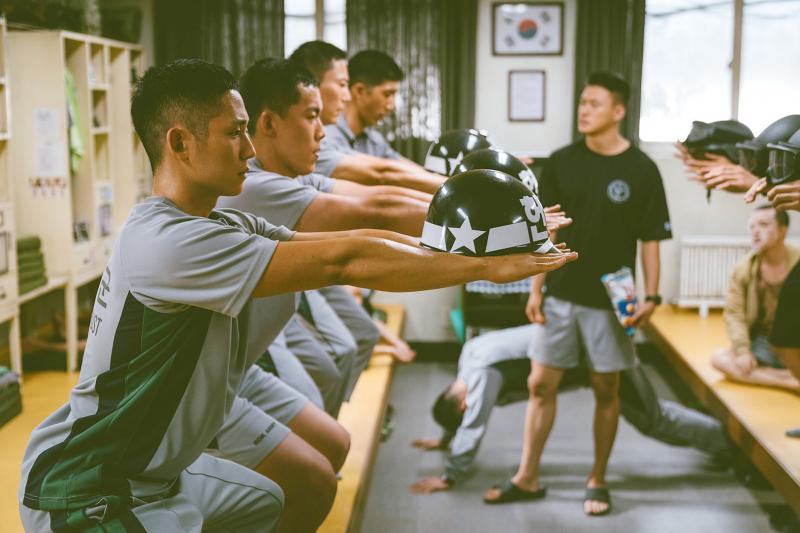A hit Netflix series is reigniting a debate in South Korea over the country’s massive military, its history of abuse scandals, and the mandatory conscription that fills its ranks with young men.
D.P., short for Deserter Pursuit, has been among the top Netflix shows in South Korea since it premiered at the end of August.
The series follows military police assigned to capture deserters, shining a light on daily life for many conscripts, including mental and physical abuse from other soldiers.

Photo: Reuters via Netflix
Director Han Jun-hee said he sought to tell a humanising story about how the system makes deserters both victims and criminals, as well as the toll it takes on those forced to do the hunting.
“D.P. is a story of tracing a deserter, but at the same time, it is a paradoxical story of looking for someone’s unfortunate son, brother, or lover,” Han said.
Asked about the popularity of the show, a defense ministry spokesman said that the military environment has changed and that the ministry has tried to stamp out abuse and harsh treatment.

Photo: Reuters via Netflix
Last week the military announced that even before the series came out, it had planned to do away with the system of having rank-and-file soldiers track down AWOL comrades. That change will go into effect in July next year.
South Korea maintains an active duty military of 550,000, with 2.7 million troops in reserves, amid decades of tensions with North Korea. All men must serve for up to 21 months, depending on the military branch.
South Korea’s military criminal law punishes desertion by up to 10 years in prison.
The Defense Ministry says abuse and desertion among conscripts are down, largely because of a 2019 decision to allow enlisted soldiers to use cellphones in their barracks.
The ministry declined to confirm the exact number of deserters, but South Korean media reported that 55 cases were reported last year, down from 78 in 2019. Military deaths by suicide also dropped from 27 to 15 in the same period.
HEATED DEBATE
The series landed as the country debates the future of conscription and the potential for abuse, particularly as young men facing dim economic prospects have complained of losing time to military service that they could have spent on studies or work.
In 2018 a Supreme Court ruling for the first time found that conscientious objection is a valid reason to forgo military service. Parliament last year passed a bill allowing K-Pop stars to postpone their military service to when they are 30.
The military has been rocked by multiple sexual abuse scandals this year, prompting lawmakers to pass a law that sex abuse and violent crime in the military will be handled by civilian courts.
Reaction to the series among former conscripts has been mixed, with some saying it mirrored their experiences, others saying its depictions of abuse are overblown, and some avoiding the show altogether to prevent traumatic memories from resurfacing.
“There is a scene in D.P. where they throw combat boots (at the soldier). I went through a lot of similar harassments,” said Ma Joon-bin, who described his time between 2013 and 2014 as the “dark ages.” “Now that I look back I feel it was unfair, but back then it was so common.”
Lee Jun-tae, 24, who served from 2017 to 2019, said he had never experienced or heard of any of his friends suffering abuse during their service.
“There was no harsh treatment during my time,” he said.
Last week the presidential favorite for the ruling party, Lee Jae-myung, called the stories in the series a “barbaric history” of South Korea. Hong Joon-pyo, an opposition party candidate, has said he endured cruelty as a soldier and pledged to consider moving to voluntary military service.
Ending conscription won’t solve all the problems if broader military culture doesn’t change as well, said pop culture critic Kim Hern-sik, who served as a D.P.
“As long as there is military service, whether mandatory or voluntary conscription system, problems are inevitable one way or another,” Kim said.

June 9 to June 15 A photo of two men riding trendy high-wheel Penny-Farthing bicycles past a Qing Dynasty gate aptly captures the essence of Taipei in 1897 — a newly colonized city on the cusp of great change. The Japanese began making significant modifications to the cityscape in 1899, tearing down Qing-era structures, widening boulevards and installing Western-style infrastructure and buildings. The photographer, Minosuke Imamura, only spent a year in Taiwan as a cartographer for the governor-general’s office, but he left behind a treasure trove of 130 images showing life at the onset of Japanese rule, spanning July 1897 to

In an interview posted online by United Daily News (UDN) on May 26, current Chinese Nationalist Party (KMT) Chairman Eric Chu (朱立倫) was asked about Taichung Mayor Lu Shiow-yen (盧秀燕) replacing him as party chair. Though not yet officially running, by the customs of Taiwan politics, Lu has been signalling she is both running for party chair and to be the party’s 2028 presidential candidate. She told an international media outlet that she was considering a run. She also gave a speech in Keelung on national priorities and foreign affairs. For details, see the May 23 edition of this column,

The Taiwan People’s Party (TPP) on May 18 held a rally in Taichung to mark the anniversary of President William Lai’s (賴清德) inauguration on May 20. The title of the rally could be loosely translated to “May 18 recall fraudulent goods” (518退貨ㄌㄨㄚˋ!). Unlike in English, where the terms are the same, “recall” (退貨) in this context refers to product recalls due to damaged, defective or fraudulent merchandise, not the political recalls (罷免) currently dominating the headlines. I attended the rally to determine if the impression was correct that the TPP under party Chairman Huang Kuo-Chang (黃國昌) had little of a

At Computex 2025, Nvidia CEO Jensen Huang (黃仁勳) urged the government to subsidize AI. “All schools in Taiwan must integrate AI into their curricula,” he declared. A few months earlier, he said, “If I were a student today, I’d immediately start using tools like ChatGPT, Gemini Pro and Grok to learn, write and accelerate my thinking.” Huang sees the AI-bullet train leaving the station. And as one of its drivers, he’s worried about youth not getting on board — bad for their careers, and bad for his workforce. As a semiconductor supply-chain powerhouse and AI hub wannabe, Taiwan is seeing